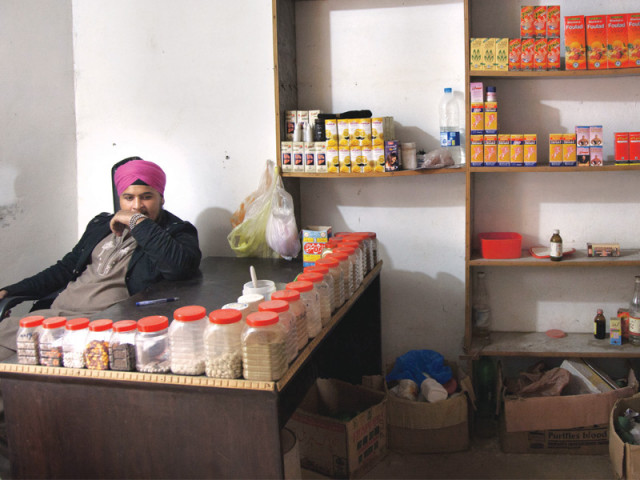Its elemental my dear Singh
Saidpur Village exists in present day Pakistan but chunks of it look like they’re straight out of the Mughal era.

Saidpur Village exists in present day Pakistan but chunks of it look like they’re straight out of the Mughal era.
20-year-old Suraj Singh would have fit right in that era. A look at him and the time machine seems less of a myth. Basking comfortably in the sunshine of a sunny winter day in Islamabad, Singh looks unfazed by the fast pace of life, as he sits on a chair perched outside his shop on a slope of Saidpur. His flushed, reddish-fair complexion and striking green eyes stand out under a magenta turban, tied on his head in the typical Sikh fashion. The heavy-set young man is almost shy on approach.

“I’ve never thought about doing anything else,” says Singh, who dropped out of school and is now learning the ropes of herbal medicine from his older brother Sardar Amarjeet Singh. It is, after all, a part of his Sikh-Afghan heritage.
Singh tends to his father’s Yoonani dawa khana, which offers traditional herbal medication in the genre of hikmat. His father, a Sikh hakeem called Sardar Rawail Singh, owns three stores: one in Rawalpindi, one in Saidpur Village and the oldest one in G-11 Markaz. Rawail and his three sons shuttle between their home in Hassan Abdal to their shops in the twin cities. “Ask anyone in G-11 where the hakeem sits and they will guide you to my father,” says Singh with pride.
On an average, the Singh family’s shops earn between Rs6,000 to Rs20,000 a day which allows the family a comfortable living. However, business was better when competition was not so tough. The influx of Sikh migrants over the years, and more Sikh hakeems setting up shops, has reduced their clientele.
Some 22 years ago, Suraj’s family migrated from Kunduz, Afghanistan, to Hassan Abdal, a small town in northern Punjab, and made a modest home near the Gurdwara Panja Sahib, one of Sikhism’s holiest sites. Singh and his family live as part of a tightly knit Sikh community, near the revered temple where every year thousands of Sikh devotees gather for pilgrimage.

PHOTO: AURANGZEB HANEEF
Yoonani, in Arabic, means “Greek.” This very title pays tributes to its origins, as it is said to have been developed by the legendary Greek physician Hippocrates, who expanded on the medical traditions of ancient Egypt and Mesopotamia Though it’s been practiced in one form or another for thousands of years, it is now considered a formal branch of what allopaths may term “alternative medicine”. While many still believe staunchly in treatment through hikmat and not allopathy in Pakistan, speculations that steroids are heavily added to it make users skeptical. It makes it therefore imperative that the hakeem they go to is not a quack but a trusted one. Singh’s family seems to have earned that trust over the years.
Hikmat is based on the ancient concept of the four ‘humours’ that exist in the human body, and their corresponding ‘element’. These are Blood (air), Yellow Bile (fire), Black Bile (earth) and Phlegm (water). These elements must be in a state of balance, or else the body can suffer different kinds of ailments.
It occurs to me at this point, that Pakistan’s own elements — the religious majority and minorities — are anything but balanced. Were they to exist in a state of harmony, peace and coexistence, Pakistan would undoubtedly be a happier, healthier and more functional place.

Luckily, Singh jolts me out of my somewhat depressing reverie by telling me, “I have never suffered any discrimination or persecution in Pakistan. It is my home.”
Above the shop’s door, a signboard hung over baked red clay bricks says, “Dawa hum dete hain. Shifa Allah deta hai (We prescribe medicine. It is Allah who Heals).” Underneath the signboard, Suraj Singh, a follower of Guru Nanak Dev, sees you off with a smile. Here at least, it seems the elements have some together.
(With additional input by Myra Iqbal)
Published in The Express Tribune, Sunday Magazine, December 30th, 2012.
Like Express Tribune Magazine on Facebook to stay informed and join the conversation.



















COMMENTS
Comments are moderated and generally will be posted if they are on-topic and not abusive.
For more information, please see our Comments FAQ